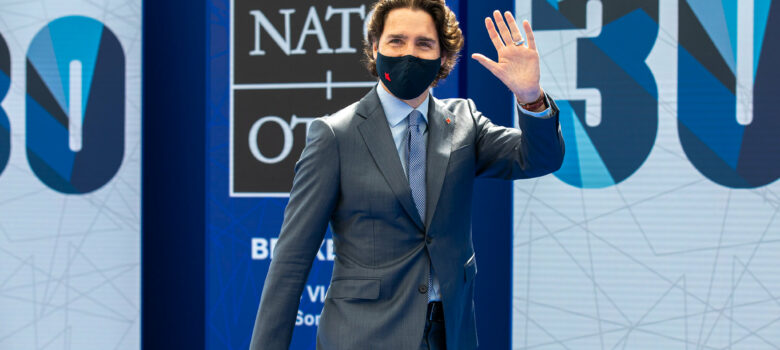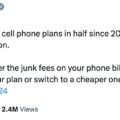The Liberal party released its election platform yesterday and perhaps everything you need to know can be gleaned from the fact that Canadian Heritage Minister Steven Guilbeault posted multiple tweets about plans for new cultural spending initiatives and Internet regulations in French without a single English language tweet. This is surely not a coincidence since the government’s digital policies have long been designed to curry favour in Quebec, even at risk of angering voters in the rest of Canada. Based on decision to forge ahead with Internet regulations with enormous implications for freedom of expression, alienating voters in the rest of Canada that have raised concerns with policies such as Bill C-10 is not a worry for the Liberal government.
Neither, it would seem, is the affordability of Internet and wireless services, which do not receive a single mention or direct policy measure. In doing so, the party has seemingly abandoned wireless competitiveness as an issue and unequivocally sided with the big telecom companies despite presiding over some of the world’s most expensive wireless services. The party platform is titled “Forward for Everyone” but not everyone moves forward in quite the same way with big telecom companies moving further ahead than Canadian consumers.
Moving ahead is also the theme of Internet regulation. The Conservative platform addresses similar terrain, though it repeatedly emphasizes the need to safeguard freedom of expression. There is a freedom of expression reference in the Liberal platform, but the actual policies tell a different story. The Liberals commit to reintroducing Bill C-10 and Bill C-36 as well as introducing online harms legislation and mandated payments for linking to news articles. The platform also promises to re-introduce Bill C-11, the privacy reform bill that went nowhere after being tabled last November.
The positions are not a surprise, but do raise several issues. First, the public concerns associated with Bill C-10 simply don’t seem to matter. The government has had multiple opportunities to address the legitimate concerns associated with the bill, but instead plans to double down, promising re-introduction within 100 days. Second, the government’s myriad of policy consultations on issues such as online harms and news payments – which are incredibly inappropriate during an election period – are just theatre given that the Liberals already know what they plan to do and have identified the policies in their platform. If the issues have already been decided, what is the point of a public consultation? For a government once elected on greater consultation, running what amount to fake consultations is shameful. Third, there is a clear hierarchy among policy issues, with Internet regulation at the top and privacy at the bottom. It is difficult to understand why the Liberals are so disinterested in privacy for which there is broad-based support, but the signals are clear: online harms and Bill C-10 within 100 days, privacy sometime later.
Copyright also pops up several times in the platform. There are two specific commitments: a new re-sale right for artists and a right of repair for consumers. The right of repair reform is long overdue and welcome. There are additional references to copyright protection, but without specifics. Those following the issue know that there have been multiple copyright consultations with the prospect of copyright term extension, website blocking, and an exception for text and data mining in support of artificial intelligence all on the agenda.
The biggest digital policy surprise of the platform must surely be the decision to avoid the wireless and Internet cost and competition issue altogether. There are references to rural broadband and spectrum use, but communications costs and the state of Canadian wireless has been a major consumer issue for years. In 2019, it emerged as an election issue with all parties making commitments to address the issue. To simply abandon wireless affordability is remarkable, sending an unmistakable signal that the Liberals have sided with the Big 3 telecom providers over the interests of Canadian consumers and the introduction of greater competition.











I assume this is because they’ll want the help of the Big3 when they try to control online speech.
Let the virtual book burning begin.
Trudeau and Gulbeau have such a hard-on for this legislation and I keep asking why??
The platform is an absolute disaster from my standpoint. Along with the issues Geist raised, I also found a number of other items within the platform as well. This includes implementing the link tax within 100 days, vague references to cyber security, and a possible reference to anti-encryption efforts as well. If anyone is interested, I have my own analysis in two parts:
https://www.freezenet.ca/liberal-party-releases-platform-our-analysis-part-1/
https://www.freezenet.ca/liberal-party-releases-platform-our-analysis-part-2/
They have a number of commitments such as privacy reform, connecting rural and indigenous communities to broadband, and the Digital Charter, but their actions from the last mandate certainly indicates those policies are going to once again get shelved sometime after the election is over.
I also found that it’s telling that the Liberals aren’t even bothering to hide the Link Tax, online harms, and Bill C-10. In fact, they are running on it openly. If the Liberals win, that speaks to a very scary future for anyone who believes in freedom of expression, entrepreneurship, innovation, and online rights. Scary stuff.
Ah, more “copyright reform”. So what, author’s life plus 300 years? Walt Disney isn’t getting any younger. And privacy legislation, what a great idea from the last election to pretend to do and then push anti-privacy law, again.
Publishing the platform with only a couple weeks to go is intentional. They expect a majority government, so they can replace failed promises with horrible plans and later call that their mandate.
Many are recycled Conservative ideas Harper’s government pushed. “The price of liberty is eternal vigilance” shouldn’t mean fighting against every party reintroducing the same failed bill until it passes. The Conservative cries for freedom of expression aren’t principled, only a kneejerk reaction to websites enforcing their Terms of Service against what they deem misinformation; what about the website owner’s free expression? It’s their website. Mr. Geist could remove my comment, if he wishes, as it’s his website, his freedom of expression and not mine. Why can’t I post anything I want on Conservative.ca?
Mr. Geist isn’t the only one sounding the alarms. My name above is a link to an interview of privacy lawyer David Fraser, interviewed by lawyer Ian Runkle, on the Harming Online proposal. The Too-Long-Didn’t-Watch is the Liberal plan is shockingly oppressive.
I don’t see myself on the fringe (or cutting-edge) politically. Why are the major parties pushing average voters to the fringe over basic tenets of liberal democracy? Do they feel so securely in power that they can announce their intentions against voter interests and get a mandate?
The copyright reform thing can mean just about anything at this point. It could very well be copyright term extension. It could also be tightening anti-circumvention laws, removing limits on copyright infringement, site blocking, three strikes law, or a whole host of other terrible ideas.
The Conservatives reaction to Bill C-10 on free speech grounds may be disingenuous, but Bill C-10 would have been a disaster for free speech anyway. The short of it being that if you aren’t a part of the establishment media organizations, you’re going to see your viewership magically disappear if you depend on algorithms. That is only the tip of the iceberg on that one.
The online harms proposal is actually an international disgrace. Not only are advocates like Geist freaking out over it (and rightfully so), but it is also the subject of international condemnation as well. The international community is worried that this will set a precedent for other countries to follow suit. Canada could very easily start something terrible on the free speech front. In its current form, the real question is whether people can continue to run websites at all should this become law. In its current form, that’s really not all that possible with any degree of certainty.
At this stage, my hope is that the Liberals do not get their majority. If they do, they are probably going to put a bullet into the brains of the free and open Internet in Canada. Definitely worried about the future of the Internet in Canada at this point.
andbecause my costs have already risen 54% since last year , and all the other stuff like food etc… i can’t on disability even doubled vaxxed afford a smart phone …so i can get doug fords vaccine passport, his alternative has me buy a printer and printer ink nealry as expensive and just for this when microsoft windows ten has had for half a year a hacker exploit for the printer spool
i give up im just gonna lay down and die on oct 22nd i give up
This topic is very interesting and I am interested but do not know where to find, thankfully you create this topic, hope everyone will help me
It took a bit longer than expected, but I have published an analysis of the Green Party platform: https://www.freezenet.ca/green-party-releases-their-platform-our-analysis/
It was hugely disappointing. You have to sift through a bunch of great sounding commitments to get to the two points that really undo this: They support the Heritage Committee report that pushes the Liberal’s war on the Internet with the added bonus of ratcheting up copyright laws (ala term extension) and they openly support Bill C-10 directly in their platform.
Just thought I’d throw this out there in case anyone is curious what another party stands for. As of now, I got all but the PPC party analyzed. Thinking I’ll just work on what they posted in the next day or so since I’m still waiting on a final version. Reason for this is that early voting starts on the 10th and I don’t think I can wait any longer.
Anyway, hope that helps!
Went ahead and posted my analysis of the PPC. There… wasn’t much there as it turns out, but here it is anyway: https://www.freezenet.ca/an-analysis-of-the-platform-of-the-peoples-party-of-canada/
I think I ended up, in the process, busting the myth that the party is the party that supports free speech. It appears to be less of a party that supports free speech and more of a party that supports speech they agree with. In my book, that’s a huge difference and the point where the party loses support from me.
All in all, now that I’ve gotten every party, this whole exercise proved that no party has the backs of those who support digital rights. Every party sucks this election cycle. Very disappointing considering I gave approval of two parties (NDP and Greens) in the last election.
Going to write a wrap-up article some point soon, but that’s the general conclusion. Every party sucks even though OpenMedia basically posted the answer key to a good platform. :\
I finished the roundup of every platform in the election: https://www.freezenet.ca/party-platforms-for-the-2021-canadian-election-compared-a-roundup/
Hugely disappointing to see the sorry state of politics today in this area. As I mentioned in the above comment, every party sucked in this front. You really have to pick and choose which rights you want to support and which right you want to trash if you are trying to vote this election. I don’t know if this means we are going to be in for an even worse government next time around, but this can’t be a good sign.
Anyway, I hope I was able to add to this and hope I won’t get shut down before the next election to offer this kind of coverage again.
The Conservative cries for freedom of expression aren’t principled, only a kneejerk reaction to websites enforcing their Terms of Service against what they deem misinformation. Great article to read!
Cheers!
https://www.tileinstallationtampafl.com
Many are recycled Conservative ideas Harper’s government pushed. “The price of liberty is eternal vigilance” shouldn’t mean fighting against every party reintroducing the same failed bill until it passes. The Conservative cries for freedom of expression aren’t principled, only a kneejerk reaction to websites enforcing their Terms of Service against what they deem misinformation
(https://www.kirksrenovations.org/)
The government has had multiple opportunities to address the legitimate concerns associated with the bill, but instead plans to double down.
They have a number of commitments such as privacy reform, connecting rural and indigenous communities to broadband, and the Digital Charter, but their actions from the last mandate certainly indicate those policies are going to once again get shelved sometime after the election is over.
Joana of https://www.drywallmidland.com/
The exact smae thing is happening over here in Europe. It is really sad.
Markus from https://www.nccar.org/
I wish and pray that our government will have initiatives like this.